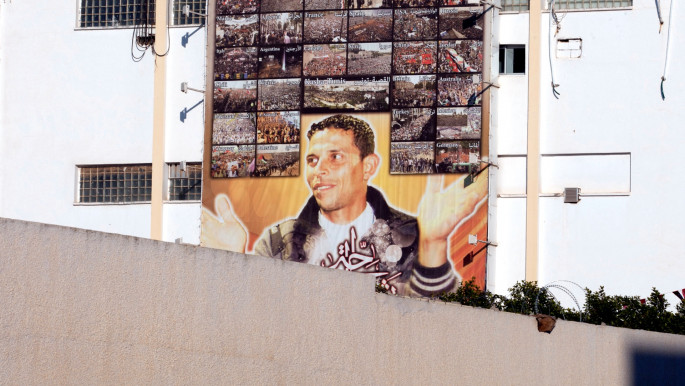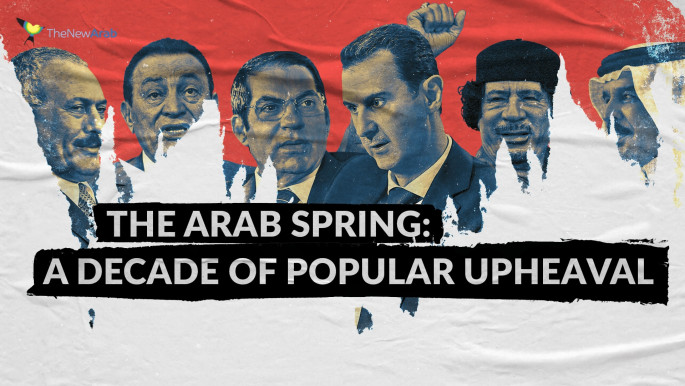How Putin's Russia helped crush the Arab Spring
Russian President Vladimir Putin never believed that those Arab countries could become democratic, either on their own or with the help of Western military intervention, and his country has gained immeasurably from the brutal subversion of popular uprisings.
In a September 2015 address to the UN General Assembly, Putin lambasted what he called the export of so-called democratic revolutions by Western powers to Arab-majority countries.
In Putin's view "aggressive foreign interference" failed to bring about reforms or democracy but instead led to the destruction of Libya and Syria and the infamously bloody rise of the Islamic State (IS).
"Instead of the triumph of democracy and progress, we got violence, poverty and social disaster – and nobody cares a bit about human rights, including the right to life," he declared. "I cannot help asking those who have caused the situation, do you realize now what you've done?"
This was part of a consistent theme Putin has reiterated time and again since the onset and bloody aftermath of the Arab Spring. He has taken action, directly intervening militarily in conflicts and generally supporting authoritarian Arab leaders.
 |
Russian President Vladimir Putin never believed that those Arab countries could become democratic |  |
Events sparked by the Arab Spring in Libya and Syria in particular likely motivated Putin to get his country more deeply involved in the region. In the former, Libyan dictator Muammar Gaddafi cracked down on the Arab Spring uprising in his country, infamously sending warplanes to bomb protesting Libyans in the country's second city, Benghazi. NATO intervened and was authorised by the UN Security Council to establish a no-fly zone to shield civilians in Benghazi from airstrikes.
However, it quickly went further than that mandate permitted with its so-called 'lead behind' strategy, in which supporting airstrikes enabled Libyan rebels to march westward from Benghazi and capture the capital Tripoli. By October 2011, rebels captured Gaddafi and brutally murdered him.
 |
|
| Mohamed Bouazizi, 1984-2011: The fire that lit the Arab Spring |
Putin was an early critic of that intervention when it was still ongoing, and at a time when Dmitry Medvedev was briefly Russia's premier. In April of that year, during a meeting with his Danish counterpart, he argued that authoritarian rule was the norm for, and true nature of, the region.
"Look at the map of this region, there are monarchies all around," he declared. "What do you think they are – Danish style democracies? No. There are monarchies everywhere, and this basically corresponds with the mentality of the people as well as long-standing practice."
Russia, which had previously forgiven Gaddafi his Soviet-era debts in return for new arms contracts, lost out on billions of dollars in potential deals as a result of his regime's collapse. For Libyans the outcome was much more tragic as their country devolved into a civil war that has now lasted for a decade.
Syrian President Bashar al-Assad cracked down ruthlessly on widespread and peaceful demonstrations when the Arab Spring swept across his country. Putin did not want a repeat of Libya in Syria and threw his lot in behind Assad despite his regime's brutality and massacring of civilians.
 |
Putin's endorsement of authoritarian rule across the Middle East has had tangible military and strategic benefits for Moscow |  |
Russia, alongside China, consistently vetoed Security Council resolutions condemning Assad's crackdown. Only in September 2013 did it agree to a UN resolution compelling Syria to surrender its chemical weapons stockpile after a US-led coalition briefly contemplated launching airstrikes in response to the lethal August 2013 Eastern Ghouta chemical attack that killed hundreds of civilians.
Just over two years after that heinous atrocity, and mere days after Putin's 2015 speech criticising Western intervention in the region, the Russian military overtly intervened in the Syrian war on the side of Bashar al-Assad. At that point in time Assad's regime only retained hold over a quarter of the country and was on the defensive. Russian airstrikes enabled his forces to rebound and eventually retake an offensive position.
The Russian air force also targeted hospitals and gave decisive support to the Assad regime's wholesale destruction of urban areas, most infamously East Aleppo in 2016, killing thousands of civilians in the process. Putin invariably justified the intervention as necessary to combat terrorism and maintain security and stability in the region.
The Russian intervention saved Assad's regime and was, in some respects, arguably a somewhat perverse kind of revenge for the NATO intervention in Libya. In the latter case, Western air forces launched supporting air and missile strikes in support of rebels fighting a repressive regime. The inverse was the case with Russia's Syria intervention.
Putin's endorsement of authoritarian rule across the Middle East in the ashes of the Arab Spring has had tangible military and strategic benefits for Moscow.
In Syria, Damascus agreed to lease the air and naval bases Russia was using in western Syria to Moscow for 49 years. The Hmeimim airbase and Tartus naval base provide Moscow with a hugely significant foothold it can use to project military power into the strategically-important Eastern Mediterranean.
Also, in the devastating aftermath of the Arab Spring, Russia has established the closest defence relations it has had with Egypt for over a generation under that country's president Abdel Fattah el-Sisi.
Putin has never even mildly criticised Sisi's numerous human rights violations since his rise to power following the July 2013 military coup against the democratically-elected Muslim Brotherhood government of Mohamed Morsi, who came to power following the January 2011 Egyptian Revolution in which millions of Egyptians rose up against their autocratic president Hosni Mubarak.
 |
Russia's intervention saved Assad's regime despite the brutality of its crackdown on Syrian protesters |  |
Russia has since sold Egypt billions of dollars worth of advanced fighter jets, helicopter gunships, and air defence missile systems in the largest arms sales Moscow has made to Cairo since the 1960s and 1970s.
Both countries have also held joint naval drills in the Mediterranean, and there have even been discussions about allowing their air forces to use each other's airbases. All of this underscores how much Russia has gained economically, militarily, and strategically from Egypt under the authoritarian rule of Sisi.
In neighbouring Libya, Russia has also expanded its influence in the country in recent years. Putin has supported Libyan warlord General Khalifa Haftar and his Libyan National Army (LNA), which has fought the rival UN-recognised Government of National Accord (GNA) based in the capital Tripoli.
 |
|
| Read more: Is the Arab Spring still relevant a decade later? |
Russia has deployed Wagner Private Military Contractors (PMCs) and weapons to Libya in support of the LNA. It has also wielded significant influence over Haftar and his LNA in eastern Libya. In May, as the LNA's brutal siege on Tripoli was broken by the Turkish-backed Government of National Accord (GNA), Russia deployed unmarked warplanes to eastern Libya, which undoubtedly helped deter further advances eastward by the GNA.
The deployment of these warplanes in Libya, which are most likely flown by Russian pilots employed by Wagner, gives Moscow another de-facto foothold on the Mediterranean which the United States believes could have ramifications extending far beyond Libya.
"If Russia seizes basing on Libya's coast, the next logical step is they deploy permanent long-range anti-access area-denial capabilities," warned Air Force General Jeff Harrigan following the initial deployment of the warplanes in May. "If that day comes, it will create very real security concerns on Europe's southern flank."
Thanks to the presence of its Wagner mercenaries on the ground in Libya and its influence over Haftar's LNA, Russia will undoubtedly have a substantive say in future peace negotiations aimed at both averting the continuation of the civil war between the GNA and LNA and formally reunifying Libya under one government.
These developments demonstrate just how much Putin's Russia has gained following the crushing of the Arab Spring and the tragic subsequent descent of those nations and their peoples, who sought and yearned for a more democratic and dignified future a decade ago, into even greater authoritarianism and conflict.
Paul Iddon is a freelance journalist based in Erbil, Iraqi Kurdistan, who writes about Middle East affairs.
Follow him on Twitter: @pauliddon





 Follow the Middle East's top stories in English at The New Arab on Google News
Follow the Middle East's top stories in English at The New Arab on Google News


